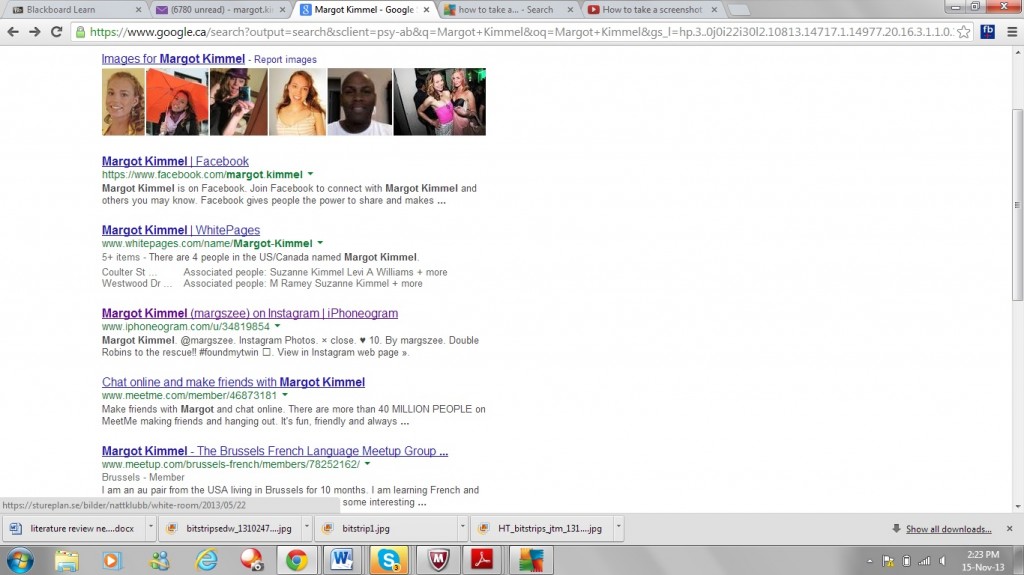While conducting research for my term paper, I came across an article about the creation of “social identity” on Facebook, focusing mostly on Iranian users (See article, “Construction of Social Identity in Social Media: An investigation of Iranian Users’ Appearance in Facebook”,http://search.proquest.com/docview/1370189880#). The article talks about the globalization of Facebook and other social media sites, and the cultural differences of users in diverse areas of the world and how these differences affect the use of Facebook and identity display online. It concentrates on how related the “social role” of a user is on Facebook is to their role/identity outside the media world. What I found interesting is that their research showed that half of Iranian Facebook users do not use their full names or change them in some way in order to protect their privacy. It was also found that 40% of them have a second fake account which they use to surf the site undercover, allowing them to post things that they won’t be held accounted for. Many of them also make the access to their profiles very private, limiting it to people they only know very well. When asked why they do this, many users said that they feel their social identity is very much connected to their real identity, and they therefore are more concerned about their image on social media. Many of them think of social media as their “private social space.”
I feel that this deep concern for privacy and many careful steps taken to protect this privacy shows a strong cultural difference from Western users, especially when you look at the rising popularity of “mediated voyeurism”, a term Clay Calvert uses in his book Voyeur Nation: Media, Privacy, and Peering in Modern Culture to describe the taking-in of images and information from other’s lives through their sharing and posting over media. We have begun to take on a guilty pleasure of looking into and learning about other people’s lives online, people who we have never met in person and maybe never will. I think this is why social media has become so popular in the last few years. People use it to put themselves out there, and entertain ourselves by looking at other people’s lives shared over the internet. This makes me wonder, when I compare Iranian Facebook users, who many of which only use social media for private purposes to communicate only with close friends and family, to Western users, whom most of which have friends on Facebook whom they don’t know very well, if there is one “right way” to use social media, and how important it is to keep your real identity or to hide it.
When I think about my experience on Facebook and my “friends” on the site, I realize that I am letting go of my privacy more than I thought. I am friends with many people who I don’t know very well and who don’t know me very well in person, but who can still see all my posts, comments, pictures and personal information on my profile. I also realized that I have my privacy settings set so that anyone in the world can search my name on Facebook and see my profile and cover pictures, already giving away my identity to people I don’t even know. I even did an experiment and typed my name into Google search, and was shocked by the results. What came up was all my social media profiles: Facebook, Instagram, Twitter, my comments and “likes” on YouTube videos, as well as all of my cross-country and track and field race times—all there for the whole world to see. This can become an issue when I begin searching for jobs and employers look up my name on the internet, and find personal pictures that perhaps are not the kinds that give me the most “professional” identity. However, there is this conflict of simply letting your real identity show through over media, or hiding it.
Referring back to the article, it describes how findings have shown that people have started to include social media as an everyday part of their lives, and therefore conduct themselves over social media as they would in real life. Media even has a role in letting our real identities show, as the article suggests: “While the technology or interface determines what kinds of representations people can construct, whatever the limitations of the interface, the interface is still able to mediate identity and reflect the offline identities.” Therefore, our identity is very difficult to contain to ourselves when using social media sites.
My question to you is, how important do you think it is to keep a private identity over the internet? And how private do you think it should be? How much of your identity on the internet should be true?

